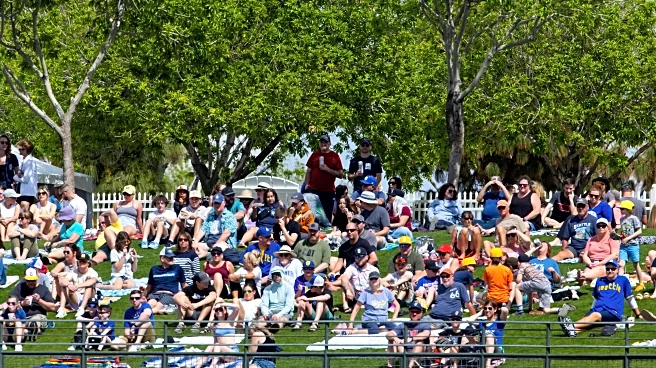What is the story about?
What's Happening?
A research team led by Takuji Kawamura from Tohoku University has published a perspective in the journal Aging, exploring the impact of exercise on biological aging. The study suggests that regular physical activity, particularly structured exercise, can slow or even reverse epigenetic aging. Epigenetic aging refers to molecular changes in DNA that reflect the body's aging process, measured by epigenetic clocks tracking DNA methylation patterns. The research indicates that structured exercise routines, which are planned and goal-directed, have a more significant effect on slowing epigenetic aging compared to general physical activities. The study also highlights that high cardiorespiratory fitness is associated with slower epigenetic aging. Findings from both human and animal studies support these conclusions, showing that exercise interventions can reduce biological age markers in blood and muscle tissue.
Why It's Important?
The findings underscore the potential of exercise as a geroprotector, offering a promising strategy for extending healthspan and improving long-term well-being. By slowing epigenetic aging, exercise could play a crucial role in maintaining physical fitness and delaying age-related decline in multiple organs, including the heart, liver, and gut. This research could influence public health policies and encourage the development of personalized exercise programs to maximize anti-aging benefits. The study's implications extend to various stakeholders, including healthcare providers, fitness professionals, and individuals seeking to improve their health outcomes. As the population ages, understanding the role of exercise in mitigating aging processes could lead to significant societal and economic benefits.
What's Next?
The authors call for further research to explore why some individuals respond more strongly to exercise than others and how different types of training affect aging in various organs. This could lead to the development of personalized exercise regimens tailored to individual needs, optimizing the anti-aging effects of physical activity. Additionally, the study suggests that long-term, intensive physical activity, as seen in Olympic athletes, may have lasting anti-aging effects, prompting further investigation into the benefits of sustained exercise over a lifetime. As research progresses, these insights could inform new guidelines and recommendations for physical activity aimed at promoting longevity and health.
Beyond the Headlines
The study highlights the broader implications of exercise beyond muscle health, suggesting that regular physical training may also slow aging in other vital organs. This expands the understanding of exercise as a comprehensive health intervention, potentially influencing cultural attitudes towards fitness and aging. The research also raises ethical considerations regarding access to exercise opportunities and the need for inclusive health policies that ensure all individuals can benefit from the anti-aging effects of physical activity.
















